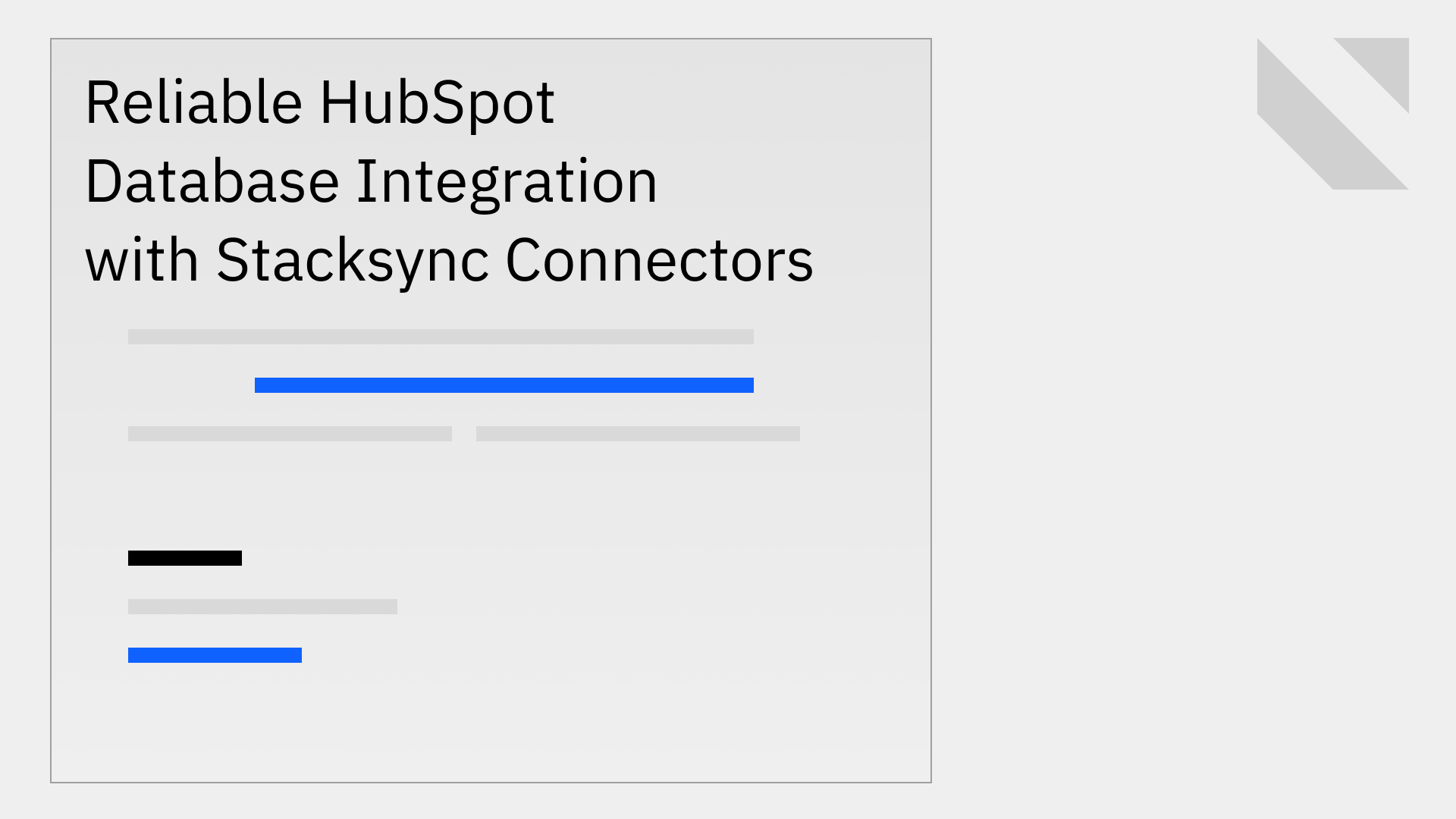In today's enterprise landscape, data is scattered across specialized systems: sales and marketing in HubSpot, finance and operations in NetSuite, e-commerce in Shopify, and analytics in databases like PostgreSQL or Snowflake. While this specialization boosts departmental efficiency, it introduces a major technical challenge—maintaining data consistency and reliability across the entire organization.
The Challenge of Integrating Disparate Operational Systems
Synchronizing data between operational systems is not just about moving information from one place to another. It requires a robust solution capable of handling:
- Complex data models
- Bi-directional updates
- Real-time performance
HubSpot Database Integration: Common Approaches and Their Drawbacks
Integrating HubSpot with an operational database is essential for custom apps, advanced analytics, or a unified customer view. However, traditional methods have significant limitations:
- Custom API Scripts: Offer granular control but require engineers to manage authentication, rate limits, pagination, error handling, and schema changes. This turns a simple sync into a complex, ongoing project.
- Generic ETL/iPaaS Tools: Provide pre-built connectors but are often designed for one-way, batch data warehousing—not operational sync. They introduce latency and may lack robust conflict resolution.
- Native Sync Solutions: HubSpot's own data sync offers code-free, two-way sync, but may not support complex transformations or advanced error handling needed for enterprise-grade integrations.
NetSuite and Shopify Integration: Unique Operational Demands
Connecting NetSuite (ERP) and Shopify (e-commerce) is mission-critical for many businesses:
- Data Model Mismatches: Each system structures customers, orders, and products differently, requiring more than simple field mapping.
- Bi-Directional Logic: Inventory updates in NetSuite must instantly reflect in Shopify, while new Shopify orders must be accurately created in NetSuite, with updates (like shipping status) syncing back.
- Scalability: The integration must handle high order volumes during peak times without failing or slowing down.
Stacksync: A Purpose-Built Solution for Real-Time, Bi-Directional Sync
Generic tools and custom scripts often fail because they're not designed for real-time, operational data sync. Stacksync is engineered to solve this problem, providing reliable, bi-directional synchronization and eliminating the complexity of custom "API plumbing."
Solving HubSpot-Database Integration
With Stacksync, you can establish a true, real-time, bi-directional sync between HubSpot and your database in minutes:
- True Bi-Directional Sync: Changes in HubSpot are reflected in your database in sub-seconds. Developers can update records directly in the database using SQL, and Stacksync propagates those changes back to HubSpot instantly and reliably.
- Automated Reliability: Handles conflict resolution (latest update wins), error handling with retries, and schema management automatically—removing the maintenance burden and ensuring data consistency.
- No-Code Setup, High-Ceiling Control: Connect HubSpot and your database via a no-code interface. Stacksync auto-maps standard and custom objects/fields, allowing instant activation. Advanced users can customize transformations and logic as needed.
Solving NetSuite-Shopify Integration
Stacksync’s architecture is built to reliably connect complex systems like NetSuite and Shopify:
- Advanced Transformations: Uses an intermediate database as a transformation layer, ensuring data is mapped and formatted correctly between ERP and e-commerce platforms.
- Guaranteed Consistency: Real-time, bi-directional links keep inventory, orders, and customer data aligned across systems, reducing errors like shipping delays or overselling.
- Effortless Scalability: Handles enterprise-level transaction volumes, keeping your integration stable and performant even during peak events.
Technical and Operational Benefits of Stacksync Connectors
Choosing the right integration approach directly impacts operational efficiency and technical debt. Here’s how Stacksync compares:
Custom Code vs. Generic iPaaS vs. Stacksync: Feature Comparison
| Feature |
Custom Code |
Generic iPaaS |
Stacksync |
| Sync Type |
Uni- or Bi-directional (High effort) |
Primarily Uni-directional (Batch) |
True Bi-directional (Real-time) |
| Latency |
Low (if engineered correctly) |
Minutes to Hours |
Sub-second |
| Reliability |
Brittle; requires extensive error handling |
Variable; often lacks conflict resolution |
Automated error handling & conflict resolution |
| Maintenance |
High; constant monitoring & updates |
Moderate; connector & workflow management |
Low; fully managed platform |
| Scalability |
Manual; requires re-architecting |
Limited by plan and architecture |
Automatic and effortless |
| Setup |
Weeks to Months |
Days to Weeks |
Minutes to Hours |
Organizational Benefits
- Eliminate Data Latency: Work with real-time, synchronized data across all systems.
- Guarantee Data Consistency: Automated conflict resolution ensures a single, reliable source of truth.
- Reduce Engineering Overhead: Free developers from integration maintenance to focus on building competitive features.
- Effortless Scalability: Platform scales automatically as your data grows—no manual re-architecting.
- Enterprise-Ready Security: SOC2 Type II, GDPR, and HIPAA compliance, with secure connectivity options like VPC peering and SSH tunneling.
Empowering Teams with Reliable, Integrated Data
Stop dedicating valuable engineering resources to brittle integrations or generic tools that can't meet your operational needs. Whether you need robust HubSpot database integration or scalable NetSuite-Shopify synchronization, the challenge is the same: your business requires a single, consistent, real-time view of its operational data.
Stacksync provides the purpose-built connectors and real-time, bi-directional sync engine to unify your tech stack, ensuring your data is always consistent, available, and reliable—empowering your teams to operate with maximum efficiency and confidence.
Citations
Ready to see a real-time data integration platform in action?
Book a demo with real engineers and discover how Stacksync brings together two-way sync, workflow automation, EDI, managed event queues, and built-in monitoring to keep your CRM, ERP, and databases aligned in real time without batch jobs or brittle integrations.
